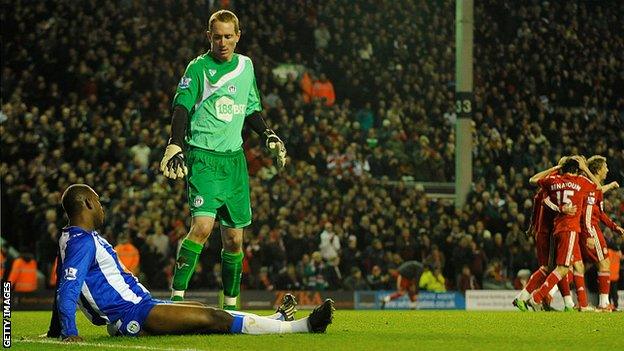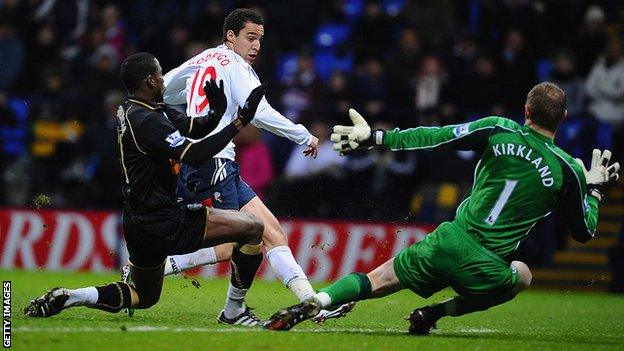Chris Kirkland on his addiction to painkillers: 'You become a totally different person'
- Published

Chris Kirkland says he did not want to leave Wigan for Sheffield Wednesday in 2012, and admits that is when his addiction to painkillers took effect
"At the start, you think 'I will just take them to help with the anxiety when I travel'. But it just progresses and your body becomes tolerant so you need more and more. They start to effect you mentally and you become a totally different person."
Former Liverpool and Coventry City goalkeeper Chris Kirkland has previously discussed his struggles with anxiety and depression - but he has now opened up about another battle he has been facing in secret.
Kirkland, 41, says he has been addicted to painkillers for the best part of a decade.
He tells BBC Radio Manchester how the issue spiralled out of control and how he would not be here today if he hadn't broken his silence.
'I was obviously desperate to play'
Kirkland, who won his sole England cap in 2006, started his career at Coventry, before earning a move to Liverpool and then Wigan Athletic, where he captained the side and played more than 100 times.
In 2012, however, the goalkeeper was out of favour under manager Roberto Martinez and signed for Championship side Sheffield Wednesday. It was after that move Kirkland says he lost control with his addiction.
I did my back at Liverpool and I wasn't on anything then. It wasn't until I moved to Wigan in 2008-09 I started to get back spasms. I was obviously desperate to play and got given painkillers. Not a lot but two or three days' worth to get over it initially.
It happened maybe two or three more times at Wigan. I didn't want to leave Wigan. I think I was treated badly by the club after being there for so long. I was there six years and I was captain but I thought Roberto Martinez didn't treat me as he should have done.
I still lived in the area as I was at the same house during my time at Liverpool and Wigan and had the same routine, but I left to go to Sheffield Wednesday.
2017: 'I was in a very dark dark place' - Chris Kirkland on anxiety & depression
The anxiety of travelling to and from Sheffield was a big issue to start with. I covered it by saying it was my wife who struggled. Everyone had written me off as the last two years at Wigan I was out of favour and didn't play. I went to Wednesday and I was flying in pre-season and I was fit as I could be.
I had the anxiety and trouble of travelling but two days before the first game I got a back injury. I thought if I don't play on Saturday I'm going to get crucified by the fans and press, and also there was a clause in the contract that if I missed a certain amount of games because of the back injury they could tear it up.
I was just desperate to play that first game to make sure I didn't get hammered in the press so I took them [painkillers].
It helped with the anxiety of travelling away from home and things just progressed from there. At the start you think 'I will just take them when I travel'. But it just progresses and your body become tolerant so you need more and more. They start to effect you mentally and you are a totally different person.
You are withdrawn. I got home from training and shut the gates and didn't want to socialise. They completely changed me and I was totally addicted to them, I was taking 10 times the amount I should have in a day.
'I was hallucinating and violently sick'

Kirkland spent six years at Wigan between 2006 and 2012
A move closer to home with Bury in the summer of 2016 was the first time Kirkland had reached out for help. However, he didn't play a game before deciding to leave the club and retire, citing personal reasons.
He managed to wrestle with his addiction for a year, but he missed life as a footballer and continued issues with his back forced a U-turn.
In 2016 I went to Bury and I should never have signed for them. That is when I was at my worst and I told the owner I was struggling. We got help, initially off the Professional Footballers' Association (PFA), and I stopped taking them for about a year.
But then I stopped missing the routine of being a footballer, having a purpose and the changing room. My back was still tender and sore so I went back on them. I broke down again in 2019 and that's when I first went to rehab and got off them again. What I didn't do, which I am this time, is tell people.
When you're in rehab it's a bubble but then you come away from that and you go back to normal life. My wife and best friend knew but they were the only ones. I ended up going back on them during lockdown. It was tough time for all of us and I couldn't get treatment on my back.
About five months ago I got some off the internet and took them one night where I was hallucinating and I was violently sick. Even after that, I woke up the next day and said I wouldn't take them again but I took some different ones again. Two weeks after that I broke down again and I went cold turkey at home. For a week, I was curled up in a corner and in the bed.
I was aching and feeling sick and the withdrawal symptoms were the worst thing I have ever been through. I got through it thanks to my wife and daughter and I feel great. I knew the story would come out and now is the time.
'You don't mean to hurt people but it's the addiction'
Kirkland says it was easy to cover up his secret as he was often travelling on the road and could order more painkillers off the internet.
You wake up thinking about it. Needing it. You plan when you're going to take more and when you need to get more tablets. If you're thinking about it first thing in the morning and last thing at night, you are addicted and you need help.
Nobody knew and you lie. It was easy for me because I was travelling to and from Sheffield and I just kept them in the car. You are sneaky and you don't mean to hurt people but it's the addiction.
I have to live with the fact I have upset my wife and my daughter. I wasn't there but you can only go forward and change your future. They were desperate for me to speak out and they know it will help them too. It's not just about me and they need some support as well. I know I can't do it on my own.
It took me 10 years but you have to talk and ask for help and it's the only way you can stay in recovery. I have tried to do it myself and failed many times but I knew if I didn't do it this time, I wouldn't be here any more.
I feel back to normal now. My wife has her husband back and my daughter has her dad back. It's motivation now for me to never go back to it.
If you, or someone you know, have been affected by addiction, there is information and support available via BBC Action Line.